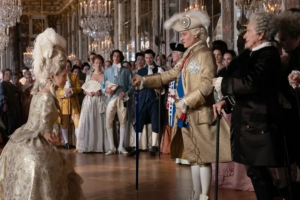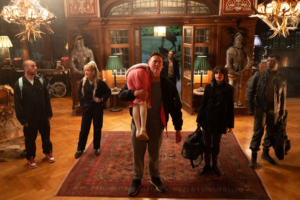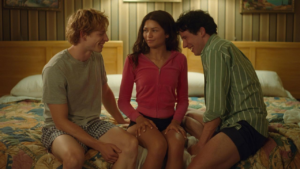by GREG KING
“The only thing I love more than a good documentary is a good music documentary,” says Australian filmmaker Lisa Nicol. “I love documentaries, which is probably why I wanted to make them myself. I’m a big fan of D B Pennebaker, Errol Morris, films like Hoop Dreams, the usual suspects,” she continues. Nicol studied communications at university and then worked in television, concentrating on making documentaries. Wide Open Sky is her first feature film.
Wide Open Sky is an inspiring documentary about Michelle Leonard and her work with the Moorambilla Voices Choir. Every year Leonard travels through some of the remote and most disadvantaged rural areas of New South Wales auditioning children for the choir. Those chosen undergo some intensive training at a special camp and then participate in the end of year concert. The documentary also introduces us to some wonderful children who share their stories.
Nicol first learned about Leonard and the choir through one of the other mothers at the school her children attend. She was looking for a story close to home because she had children of her own and was reluctant to travel too far. “Someone told me about Michelle and the choir, and that it was not an ordinary choir,” Nicol recalls. “Michelle is an absolute force of nature. And she did these incredible things with these kids, kids who had no access to music education. I thought that sounded interesting. Unfortunately it wasn’t anywhere nearby, it was in the most remote corner of the state, but it was still a good story. It was challenging because it was so far away from home, so you’ve got to organise to go out there and capture things, and the distances were challenging.”
According to Nicol it wasn’t hard to get Michelle to agree to be part of the film. Although Leonard liked the idea, she wanted to ensure that the filmmakers were aware of how important it was to protect the children. “Obviously you are dealing with young children and she felt responsible for all of those children,” Nicol elaborates. “And she had long term relationships with lots of children out there, so their welfare and well being was always paramount. It was important that we were not setting them up so that it looked like they were about to fail, or dramatising anything unnecessarily. Which we had no intention of doing. We weren’t interested in making that style of film. Obviously people were wary of us coming out and overly playing up the disadvantages and things like that. But she decided to place her trust in us.”
Nicol and her small crew followed Leonard throughout the lengthy audition process. Initially the story was supposed to be about Michelle. But when Nicol went out to the camps where the children rehearsed and watched them sing she was profoundly moved. And when the children spoke about their stories, their hopes and their dreams, Nicol changed her focus. She realised that the film became more about the children, and she wanted to let them tell their story in their own words. “We adults always talk about how music is so important to us, but I really wanted to hear from the kids why it was so important to them, and what the choir meant to them,” she adds.

The film focuses mainly on four charismatic children. “Choosing the children was a bit difficult in that we were on the road filming the auditions and we didn’t know who was going to get into the choir,” Nicol explains. ” So we were filming the audition process and keeping an eye out for possible characters and children we might want to follow during the choir experience. And that was what you might call a stressful shoot!”
The characters we follow include Mack, a wonderful Billy Elliot type with an interest in dance. He’s a young boy who has dreams of being a dancer, but he lives in a region where there is no dance class. But he also has a beautiful voice as well. Nicol had come across the young aboriginal boy Khy the year before. She felt he was such a chatty, charming little fellow he quickly piqued her interest. “He’s just such a gorgeous kid, he’s a real dynamo.” Taylah and Opal also aspire to be singers and entertainers and have strong opinions.

“They say don’t work with children or animals,” Nicol adds with a laugh. “But having said that, I’ve got kids myself and I enjoy spending time with kids, so I wouldn’t say that was so challenging. But other things that were challenging were not so much the other people in the film but other things around it – the business of filmmaking, funding bodies and convincing other people – were more of a challenge.”
Wide Open Sky was originally commissioned as a one hour documentary for ABC television, but Nicol felt that that she had something quite extraordinary that was worthy of a feature film. She had shot over 100 hours of footage, and worked closely with editor Anna Craney to shape the film, and find the narrative structure. The film did have a natural structure, beginning with the auditions at the start of the year, then the children would come together in the middle for the camp and then they would have their big show at the end of the year. “How we worked was looking at our four children and their choir experience, and what became their story,” Nicol elaborates. “So we sort of built their stories, and then we built the film. We started with the children’s stories, because very much for us the film was predominantly about the children. We wanted it very much to be from the children’s perspective and for them to be able to tell us the story in their own words as much as possible.”
The effort paid off as the film won the audience award at the 2015 Sydney International Film Festival, which Nicol admits was really thrilling, and most unexpected. The screening went really well, and the film received a standing ovation. “I didn’t think we’d win the audience award,” she recalls, “and I wasn’t even paying attention on the day they announced it. Someone had to ring and tell me. That was really really exciting!”
When asked what she hopes audiences will take away from Wide Open Sky, Nicol is quick to respond. “I hope they go and harass the government to get them to put music back into public schools and into education. That’s what I hope. And give some money to Boorambilla as well. I think that music is very important as a part of childhood,” she continues enthusiastically. “I’m a total music fan. We can justify why music is so good – it improves literacy, it improves numeracy, and it’s also good for social inclusion, it’s great for actually getting kids to come to school. So there’s all these justifications which you can put on paper. But they’re really there to get the people to sign off on cheques for music education. I just don’t feel the need to justify it, I just think that music is one of the most important things in life, and I can’t really understand why we would be raising children without it.”
Asked what she has planned as a followup to Wide Open Sky, Nicol candidly admits: “I just have little ideas percolating there which I am just doing a bit of research on, but nothing beyond that. Fairly embryonic at this stage. I don’t have confidence in myself to go out and be a director for hire. I know what I like and what I can do, so I have confidence in myself to do that. I guess that’s what having my own film company allows me to do.”

Greg spoke to director Lisa Nicol to find out more about the film.
https://www.mediafire.com/download/6oycdhpjwp2bjbp/210322_001.MP3




